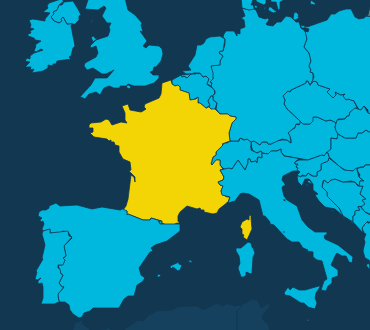 France
France

ENTRY INTO FORCE of the European Convention on Human Rights
3 May 1974
Number of implemented cases*
996
Examples
Criminal convictions for urging Israel goods boycott cancelled
Eleven people were convicted for calling for a boycott of Israeli goods in solidarity with Palestine. According to the European court, the French courts had not established why these criminal convictions were “necessary in a democratic society”. The European court’s judgment led to the cancellation of the protestors’ convictions and greater freedom to support boycotts for political reasons.
Safeguards on DNA storage after a farmer’s privacy rights were breached
Jean-Michel Aycaguer refused to give a DNA sample to police because he was concerned about his personal data. He was fined €500. The European court found that France had violated Jean-Michel’s right to privacy because the law on the storage of DNA profiles lacked sufficient safeguards. This judgment caused France to change the law to better protect personal data.
Justice for an orphan whose aunt and uncle kept her as a servant
C.N. and her sister V. were sent to live with their aunt and uncle in France after their parents died. They were put to work and made to sleep in a cold cellar. The European court found that, in particular, C.N.’s circumstances amounted to servitude and forced labour. After the European court’s judgment, France passed a new law to better define and combat human trafficking.
France recognises family ties of parents of surrogate children
Born abroad through a surrogacy arrangement, sisters Valentina and Fiorella grew up in legal uncertainty. France refused to recognise their birth certificates, which caused them and their parents countless problems. The European court found that this undermined the girls’ identities within French society. France changed its case law to recognise the family ties of parents of surrogate children.
Privacy reforms after retired couple had their phone tapped
Jacques and Janine Huvig were a retired couple who had run a fruit-and-vegetable business. Police tapped their phone and listened to their conversations. At the time, investigators had almost limitless powers to tap the phones of almost anyone for almost any reason. The European court ruled that there must be clear legal limits and safeguards to protect people’s privacy – leading to a change in...
Human trafficking criminalised after 14-year-old girl kept in domestic servitude in Paris
From the age of 14, Henriette Akofa Siliadin was kept in domestic servitude. She worked all day, 7 days a week for over 4 years, for no pay. The people responsible could not be properly brought to justice, because French law had not criminalised their actions. The case helped bring about legal reforms to combat human trafficking.
Reforms made after man convicted for waving a satirical placard
Hervé Eon waved a satirical sign at President Sarkozy. He was then charged with offending the President of France, a crime dating from the 19th Century. Hervé was convicted and given a suspended fine. The European court ruled that this had breached Hervé's right to free speech. The offence of insulting the President of France was abolished later that year.
* This figure includes all judgments and decisions from the European Court of Human Rights (including friendly settlements) concerning which the Council of Europe’s Committee of Ministers has decided that all necessary follow-up measures have been taken. Source: the database of the Department for the Execution of Judgments of the ECHR, HUDOC-EXEC.


